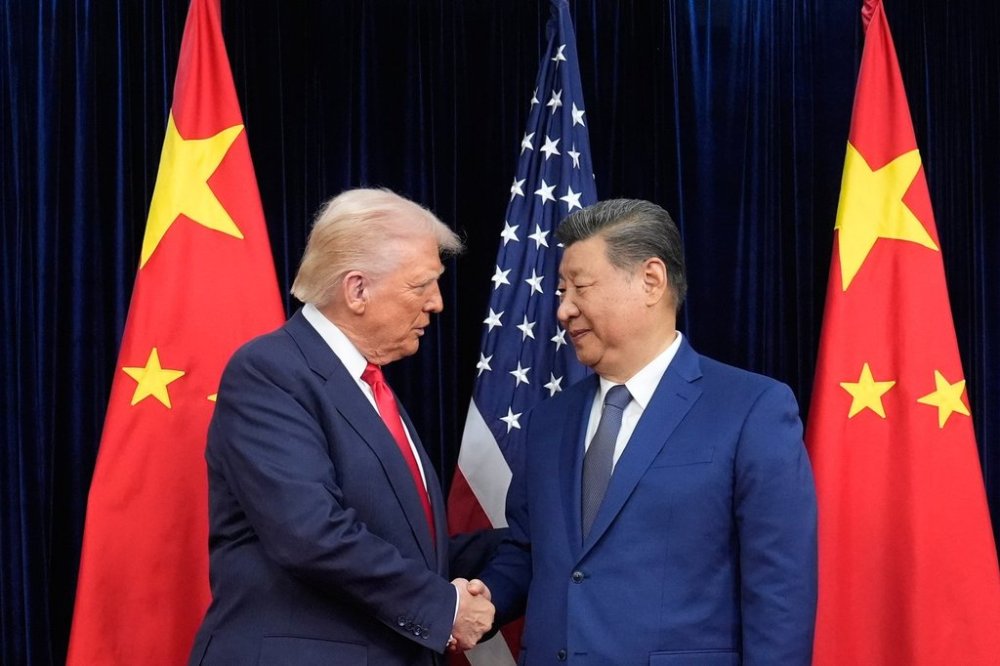World
China Imposes New Chemical Export Restrictions After Talks with Trump

China has announced new restrictions on the export of 13 chemicals used in the production of fentanyl, following discussions between President Donald Trump and Chinese leader Xi Jinping. This move aims to address a critical issue in U.S.-China relations and is seen as a step towards easing ongoing trade tensions. The restrictions will primarily affect shipments to the United States, Canada, and Mexico, where fentanyl-related overdose deaths have surged in recent years.
During recent negotiations, Trump emphasized the importance of curbing the flow of fentanyl and its precursors from China, a matter that has long been a sticking point between the two nations. In a meeting held in South Korea last month, Trump expressed optimism that China would assist in addressing the fentanyl crisis and indicated he would reduce tariffs on certain imports from 20% to 10%.
Details of the New Restrictions
The chemicals targeted by the new regulations are integral to the manufacturing of synthetic opioids, which have been linked to tens of thousands of overdose deaths annually in the U.S. According to the U.S. government, fentanyl is predominantly produced in Mexico, but many of its precursor chemicals originate from China. The new restrictions, announced by the Chinese Ministry of Commerce, are viewed as a reaffirmation of China’s commitment to cooperate with the United States on narcotics control.
Research from the Brookings Institution highlights that this cooperation has fluctuated over the years. In 2019, during Trump’s first term, China took significant steps to restrict fentanyl and its related substances following U.S. requests. However, as tensions rose over human rights issues, cooperation stalled, culminating in a formal cessation of counternarcotics efforts by 2020.
Despite the challenges, President Biden’s administration has made efforts to re-engage with China on this issue. In 2023, the U.S. designated China as a “major illicit drug-producing country” before Biden’s meeting with Xi in California, which aimed to secure Beijing’s commitment to renewed cooperation.
Implications for U.S.-China Relations
The recent export restrictions can be seen as a response to the evolving dynamics in U.S.-China relations. Vanda Felbab-Brown, a senior fellow at the Brookings Institution, noted that the Trump administration’s aggressive tariffs on China may have overlooked prior cooperative measures. She remarked that the current agreement reflects a return to strategies previously in place, suggesting that China is leveraging negotiations to reintroduce measures that were already being implemented.
The China National Narcotics Control Commission also issued a public notice reinforcing the need for businesses to comply with various regulatory frameworks, including tax codes and customs rules. While these new restrictions apply specifically to the three North American nations, other countries can still import these substances without a license, raising questions about the effectiveness of the measures.
The challenge remains that many of the basic chemicals used in legitimate industries, such as agriculture and pharmaceuticals, are also being exploited for the production of synthetic opioids. This dual-use nature complicates efforts to monitor and regulate their distribution effectively.
As the U.S. continues to identify China as a contributor to the fentanyl crisis, the implications of these new restrictions will unfold in the context of broader trade relations and public health concerns. The ongoing dialogue between Washington and Beijing will be critical in shaping future actions against the illicit drug trade.
-

 Science3 months ago
Science3 months agoToyoake City Proposes Daily Two-Hour Smartphone Use Limit
-

 Health3 months ago
Health3 months agoB.C. Review Reveals Urgent Need for Rare-Disease Drug Reforms
-

 Top Stories3 months ago
Top Stories3 months agoPedestrian Fatally Injured in Esquimalt Collision on August 14
-

 Technology3 months ago
Technology3 months agoDark Adventure Game “Bye Sweet Carole” Set for October Release
-

 World3 months ago
World3 months agoJimmy Lai’s Defense Challenges Charges Under National Security Law
-

 Lifestyle3 months ago
Lifestyle3 months agoVictoria’s Pop-Up Shop Shines Light on B.C.’s Wolf Cull
-

 Technology3 months ago
Technology3 months agoKonami Revives Iconic Metal Gear Solid Delta Ahead of Release
-

 Technology3 months ago
Technology3 months agoApple Expands Self-Service Repair Program to Canada
-

 Technology3 months ago
Technology3 months agoSnapmaker U1 Color 3D Printer Redefines Speed and Sustainability
-

 Technology3 months ago
Technology3 months agoAION Folding Knife: Redefining EDC Design with Premium Materials
-

 Technology3 months ago
Technology3 months agoSolve Today’s Wordle Challenge: Hints and Answer for August 19
-

 Business3 months ago
Business3 months agoGordon Murray Automotive Unveils S1 LM and Le Mans GTR at Monterey









